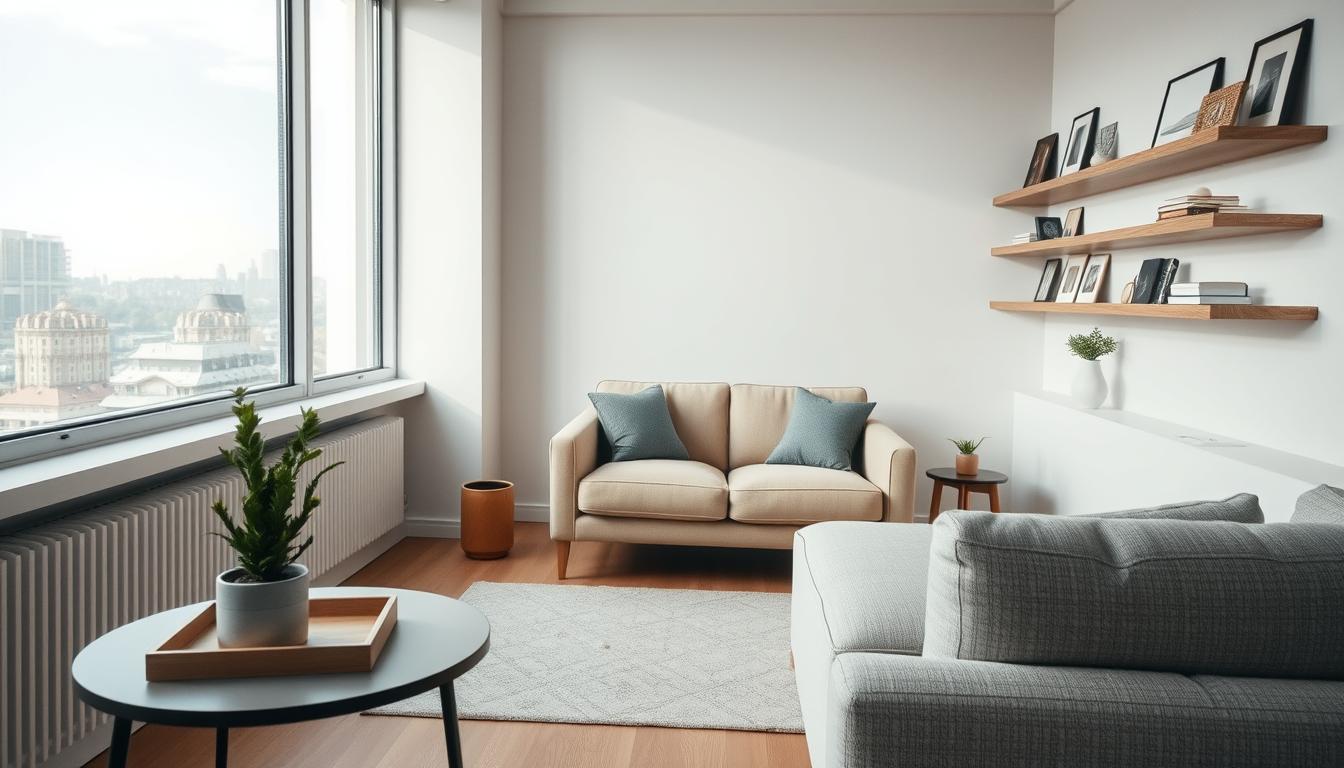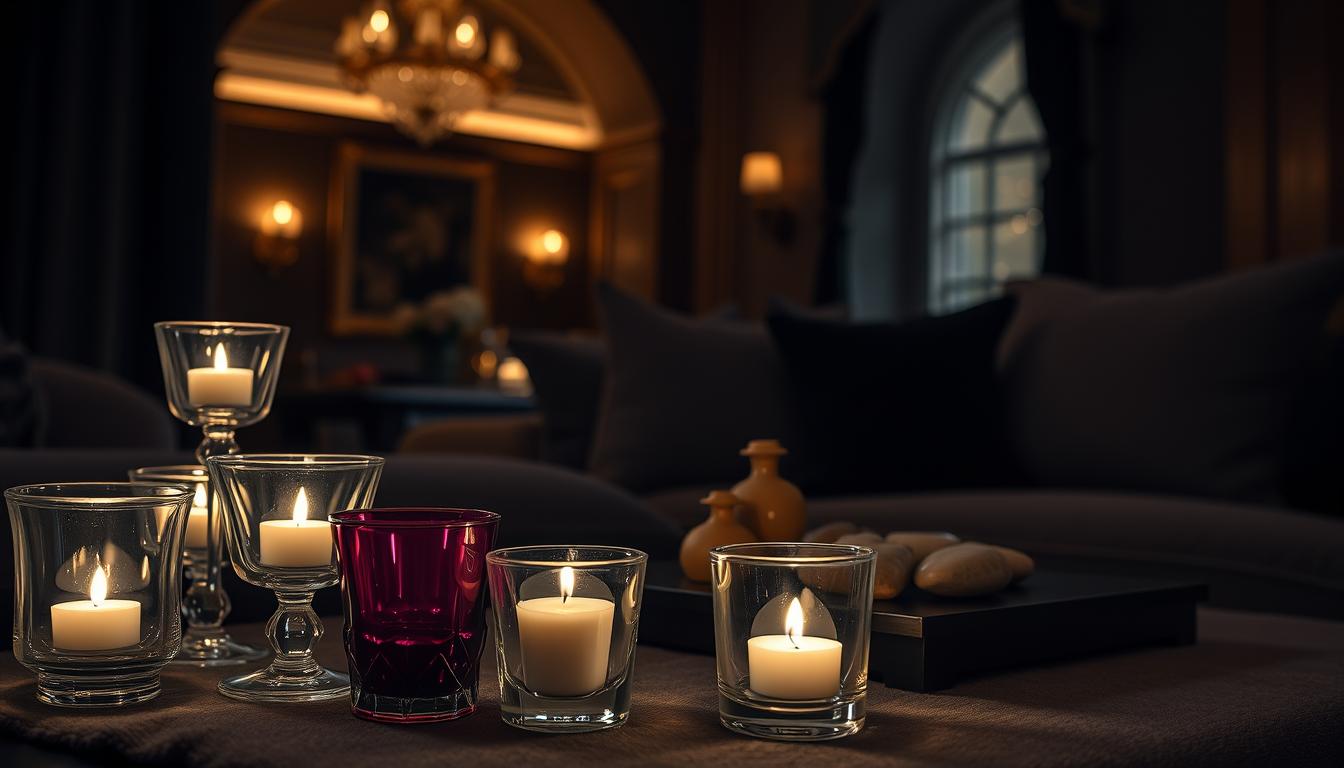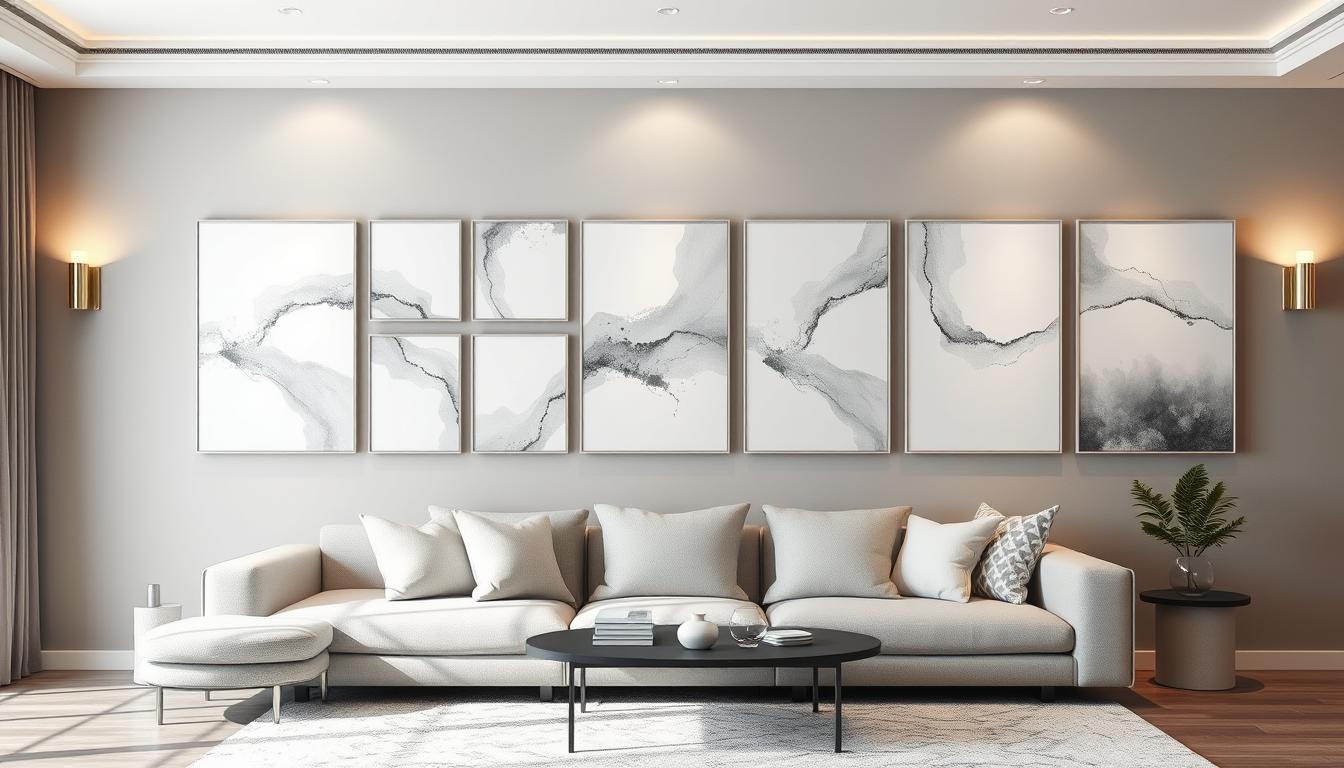Did you know nearly 75% of Americans live in urban areas where space is a luxury? This shows the challenge many face in decorating their small homes. We get how hard it is to make a cozy, stylish, and functional space when there’s little room.
Embracing minimalism and optimizing lighting are key strategies for us. We help turn small homes into cozy havens that show off your style. In this article, we’ll share our best tips to help you use your space wisely.
Key Takeaways
- Maximize natural light to make your space feel larger
- Opt for multi-functional furniture
- Utilize vertical space for storage
- Select a palette that creates a sense of openness
- Minimize clutter to maintain a cozy atmosphere
1. Embrace Minimalism for Small Spaces
To make the most of small spaces, adopting a minimalist approach is key. This method creates a sense of openness and calm in your home. It’s not just about getting rid of items; it’s about choosing what adds value and beauty.
Using Less to Create More
Minimalism in apartment decorating ideas means using fewer items to make more impact. It’s about picking a few pieces that do more than one thing or look great. This way, you can maximize space in small homes by cutting down on clutter and improving flow.
For example, a simple color scheme can make a room look bigger. Also, choosing furniture that does more than one thing can help reduce clutter. This makes your space feel more open.
Essential vs. Non-Essential Items
Embracing minimalism starts with knowing the difference between essential and non-essential items. Essential items are those that are useful or bring joy. Non-essential items are just clutter.
| Item Category | Essential | Non-Essential |
|---|---|---|
| Furniture | Sofa, Bed | Extra Chairs, Coffee Table |
| Decor | Family Photos, Artwork | Knick-knacks, Excessive Ornaments |
| Storage | Bookshelves, Closet Organizers | Duplicate Storage Containers |
By focusing on essential items and letting go of non-essential ones, you can make your living space more streamlined and functional. This not only makes your home look better but also makes it more organized and peaceful.
2. Choose Multi-Functional Furniture
Small spaces need smart solutions, and multi-functional furniture is key. By picking furniture that does more than one thing, we can make our tiny homes both functional and stylish.
Sofas That Convert to Beds
A sofa that turns into a bed is perfect for small homes. It’s comfy for sitting during the day and cozy for sleeping at night. When picking a sofa bed, look for one that’s easy to switch and lasts long.
For tiny house design, think about furniture size. A big sofa bed can make a small room feel cramped. Look for sleek, compact designs that fit your space well.
Tables with Storage Solutions
Tables with storage are great for small homes. They help keep things tidy by storing books, decorations, and more.
When picking a table with storage, think about what you need to store. Some have drawers, others have shelves or cabinets. Pick one that meets your storage needs.
| Furniture Piece | Benefits | Ideal For |
|---|---|---|
| Sofa Bed | Converts from seating to sleeping area | Small living rooms, guest rooms |
| Storage Table | Provides storage for clutter | Living rooms, dining areas |
| Nesting Tables | Can be stacked to save space | Small living rooms, coffee areas |
By using multi-functional furniture in our tiny homes, we can make them stylish and useful. Whether it’s a sofa bed or a storage table, these items help us use our space wisely. They help us live comfortably in our small homes.
3. Use Mirrors to Create Depth
Decorating small homes can be a challenge. But using mirrors is a clever trick to make rooms look bigger. Mirrors add depth and brightness, making spaces feel more open and inviting. By picking the right mirror and placing it well, you can greatly improve your small living area’s feel.
Types of Mirrors for Small Rooms
There are mirrors made just for small rooms. Large wall mirrors make rooms seem bigger by reflecting everything. Frameless mirrors are sleek and don’t split up the space. Mirrored furniture adds style and does the same job.
| Type of Mirror | Description | Effect on Space |
|---|---|---|
| Large Wall Mirrors | Large mirrors that cover a significant portion of a wall | Makes the room appear larger |
| Frameless Mirrors | Mirrors without frames, providing a sleek look | Creates a sense of continuity |
| Mirrored Furniture | Furniture pieces with mirrored surfaces, such as dressers or coffee tables | Adds elegance and creates the illusion of more space |
Placement Strategies for Maximum Effect
Where you put mirrors is key. Mirrors opposite windows reflect light, making rooms brighter. Mirrors opposite doors make rooms seem larger. Using many mirrors adds depth and interest.
“The use of mirrors can dramatically transform a small, dark room into a bright and airy space. By reflecting light and images, mirrors can create the illusion of a larger area, making them an essential tool in small room decorating.”
Here are some tips to get the most from mirrors:
- Place mirrors opposite windows to reflect natural light.
- Use multiple mirrors to create a sense of depth.
- Avoid placing mirrors directly opposite beds or sofas, as this can create a sense of discomfort.
4. Opt for Light Colors and Bright Spaces
Light colors can make small homes feel bigger and more welcoming. When we talk about cozy home styling for small spaces, color is key. The right colors can make a room look bigger and feel more inviting.
Color Psychology in Interior Design
Color psychology is important in interior design. Colors can change how we feel and act. Light colors like whites and soft pastels can make rooms feel larger and airier.
Darker colors can make a space cozy but might feel cramped in small rooms. It’s all about balance.
For example, blue can make us feel calm, perfect for bedrooms. Yellow can boost happiness, great for living areas.
Tips for Choosing the Right Color Palette
Choosing the right colors for your small home is about more than looks. It’s about natural light, room size, and what you like. Here are some tips:
- Think about the natural light: More light means you can use more colors. Less light? Lighter colors reflect what little light you have.
- Start with a neutral base: A neutral color lets you add color with furniture and decor.
- Use the 60-30-10 rule: 60% of the room is one color, 30% another, and 10% an accent. It keeps things balanced and pretty.
By picking the right colors and thinking about their effects, you can make your small home cozy and inviting. This careful approach to decorating can make your space feel bigger and more welcoming.
5. Maximize Vertical Space
To make our living areas feel bigger, we should use the vertical space in small homes. This keeps our floors and surfaces clear. It makes our homes feel more open.
Shelving Ideas That Save Floor Space
Installing shelves that reach the ceiling is a smart move. They offer lots of storage and make the room look taller.
- Use floating shelves for a clean, simple look.
- Choose adjustable shelving for items of all sizes.
- Don’t forget corner shelves to use every inch.
Hanging Artwork and Décor
Decorating the walls with artwork and decor is also a great idea. It adds beauty and makes the room lively.
- Place artwork at eye level for balance.
- Play with different frame sizes and styles for interest.
- Try a gallery wall to display many pieces.
Let’s compare different shelving options to see their benefits:
| Shelving Type | Space Saved | Storage Capacity |
|---|---|---|
| Floating Shelves | High | Medium |
| Adjustable Shelving Units | Medium | High |
| Corner Shelves | High | Low |
By using these strategies, we can make our small homes feel bigger and more organized. Our living spaces will look better and feel more welcoming.
6. Incorporate Smart Storage Solutions
Smart storage is key for organizing small spaces. Clutter can quickly build up in small homes, making them feel cramped. With smart storage, you can keep things organized and hidden, making your home feel bigger and more peaceful.
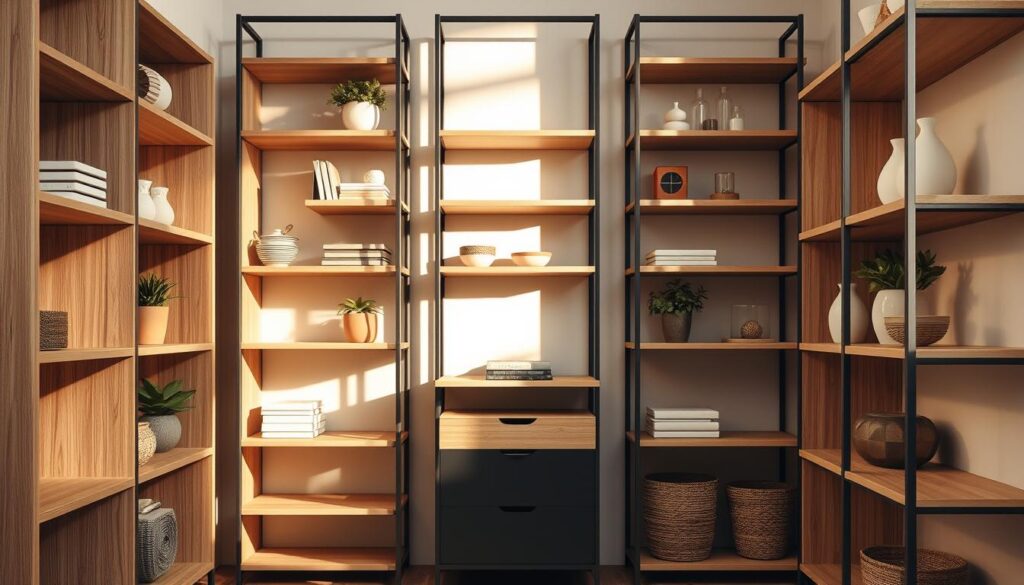
Hidden Storage Ideas
Using hidden storage is a great way to make the most of small homes. You can find:
- Under-bed storage containers or drawers
- Ottomans with storage compartments
- Hollowed-out books with secret storage
- Storage beds with built-in drawers or shelves
These solutions let you hide items you don’t need right away. This keeps your living area tidy.
Creative Ways to Organize Small Spaces
There are many creative ways to organize small spaces too. For example:
- Use wall-mounted shelves to make the most of vertical space
- Invest in multi-functional furniture with storage
- Utilize stackable containers or baskets to store items
- Opt for a storage coffee table or storage ottoman
By using these ideas, you can make your living space more organized and useful.
Good storage solutions keep your home clutter-free and look better. The right choices make your home more organized, peaceful, and welcoming.
7. Use Area Rugs for Defined Spaces
Area rugs are a simple yet effective way to define different spaces within your small home. By choosing the right size and style, you can add warmth and texture to your living areas. This creates a cozy and inviting atmosphere.
Choosing the Right Size and Style
When selecting an area rug, it’s essential to consider the size and style that will complement your space. A rug that is too small can make the room feel disjointed. On the other hand, one that is too large can overwhelm the space. Measure your room carefully and choose a rug that fits comfortably within the area you want to define.
The style of the rug should also match your home’s décor. For a modern look, consider a rug with a simple, geometric pattern. For a more traditional feel, a rug with a classic floral or Persian design might be more suitable.
Tips for Layering Rugs
Layering rugs can add depth and visual interest to your space. Start with a larger, neutral-colored rug as the base. Then, add a smaller, patterned rug on top. This technique can help define different areas within a larger room, such as a seating area or a reading nook.
When layering rugs, ensure that the textures and patterns complement each other. Avoid combining rugs with busy patterns or clashing textures, as this can create a cluttered look. Instead, opt for a harmonious combination that adds to the overall aesthetic of your home.
By incorporating area rugs effectively, you can enhance the functionality and beauty of your small home. This makes it feel more spacious and welcoming.
8. Personalize with Decorative Accents
Decorative accents are key to making a small home feel like your own. Adding personal touches can turn a small space into a cozy home.
Selecting Meaningful Décor
Choosing decorative accents that mean something to you is important. Family photos, heirlooms, and artwork bring warmth and character. Display these items on a gallery wall or as a coffee table centerpiece.
Grouping similar items creates a cohesive look. For example, a cluster of decorative objects in odd numbers, like three or five, looks great.
DIY Projects to Showcase Your Style
DIY projects are a great way to add unique touches to your home. Try making macramé wall hangings, hand-painted ceramics, or customized throw pillows to show off your style.
Here are some DIY project ideas to get you started:
- Create a photo display using reclaimed wood
- Make a customized area rug using stencils and paint
- Upcycle old furniture with a fresh coat of paint
To understand the process better, let’s compare different DIY projects:
| DIY Project | Skill Level | Time Required |
|---|---|---|
| Macramé Wall Hanging | Intermediate | 2-3 hours |
| Hand-Painted Ceramics | Beginner | 1-2 hours |
| Customized Throw Pillows | Easy | 30 minutes – 1 hour |
9. Create an Illusion of Height
Decorating small homes smartly often means using tricks like making ceilings seem higher. This makes rooms feel bigger. It’s very helpful in tight spaces where every bit of room matters.
Using Vertical Stripes in Décor
Vertical stripes are a simple trick to make rooms seem taller. They can be on walls, curtains, or furniture. It’s key to pick stripes that aren’t too wide or too thin; the best width is usually in the middle.
Think about the colors you use with vertical stripes. Contrasting colors make stripes pop, while similar shades are more subtle. For example, light walls with darker or lighter stripes add depth without being too much.
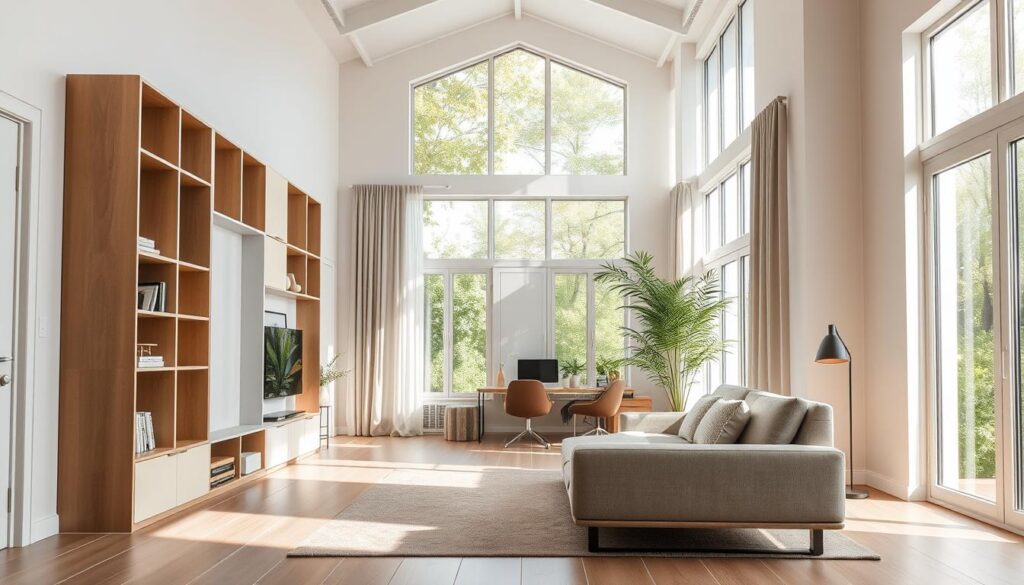
Tall Furniture Pieces for Small Rooms
Using tall furniture is another way to make rooms seem taller. Tall bookshelves, floor lamps, or storage units pull the eye up. Make sure the tall furniture fits with the room’s look to avoid making it feel cramped.
Here are some tips for picking the right tall furniture:
- Choose pieces that match the room’s size.
- Make sure the style and material fit the room’s look.
- Use tall furniture to draw attention to a spot in the room.
| Furniture Piece | Benefits | Design Tips |
|---|---|---|
| Tall Bookshelves | Maximizes storage, draws the eye upwards | Choose sturdy, well-designed units that fit the room’s style |
| Floor Lamps | Provides lighting, adds height | Select lamps with slim profiles to avoid clutter |
| Tall Storage Units | Conceals clutter, adds vertical interest | Ensure the unit is proportionate to the room and furniture |
By using these tricks, we can make small rooms feel taller and more open. Whether with vertical stripes or tall furniture, the goal is to balance our design to make the space feel bigger.
10. Consider Open Shelving
Open shelving is more than just a place to store things. It’s a design feature that can change how your living area looks. It brings elegance and keeps your home organized.
Choosing between open and closed storage is key. Open shelving makes it easy to get to your stuff and makes rooms feel bigger.
Benefits of Open vs. Closed Storage
Open shelving has many pluses over closed storage. It lets you show off your decor and keeps things you use often handy. Closed storage, on the other hand, hides mess and keeps ugly items out of sight.
Here’s a table comparing open and closed storage:
| Storage Type | Benefits | Drawbacks |
|---|---|---|
| Open Shelving | Easy access, visually appealing | Dust accumulation, visible clutter |
| Closed Storage | Hides clutter, reduces dust visibility | Limited access, less visually appealing |
Design Tips for Open Shelving
To get the most out of open shelving, follow these design tips:
- Balance your shelves by mixing decorative items with things you use.
- Keep your shelves tidy by dusting and rearranging items often.
- Use baskets or bins for small items to add texture and keep things organized.
With these tips, you can create a beautiful and useful open shelving unit that improves your home’s look.
11. Design a Cozy Nook or Corner
Cozy nooks and corners are becoming more popular. They offer a personal retreat in your home. In small spaces, a well-designed nook can be a sanctuary that enhances your home’s ambiance.
Incorporating a cozy nook into your apartment adds character and functionality. It’s about creating a space that feels inviting and comfortable. It’s perfect for reading, relaxation, or enjoying a quiet moment.
Choosing the Right Spot for a Nook
Finding the perfect spot for your cozy nook is key. Look for a quiet, comfortable area with good natural light. Choose corners away from busy areas and near windows.
Consider these factors to make the most of your spot:
- Proximity to a power outlet for lamps or reading lights
- Avoid areas with drafts or extreme temperatures
- Use spaces that are often underused, like between bookshelves or under a staircase
As interior design experts say, a great nook is not just about its location. It’s also about how it fits with your home’s décor.
Ideas for Comfortable Seating Options
The seating in your cozy nook makes it inviting. Here are some ideas for comfortable seating:
| Seating Option | Description | Benefits |
|---|---|---|
| Plush Armchair | A comfortable, oversized armchair that invites relaxation | Provides excellent back support and comfort |
| Window Seat | A built-in or cushioned seat under a window | Utilizes natural light and offers a view |
| Oversized Pillows | Large, comfortable pillows that can be arranged in a corner | Flexible and can be easily rearranged or stored |
Each seating option has its own benefits. Choose what fits your space and preference best.
To enhance your cozy nook, add soft blankets, a side table, and good lighting. As design principles say, balance is key to creating a beautiful and usable space.
“A cozy nook is not just a place to sit; it’s an experience that combines comfort, ambiance, and personal style.”
12. Don’t Forget About Lighting
Good lighting can make your small home feel bigger and more welcoming. As we look at interior decorating ideas for small homes, lighting’s role is key. It helps create a cozy and inviting atmosphere.
Layering Lighting for Maximum Impact
Using different lights like overhead, table, and floor lamps can make your space look great. This way, you can change the light levels as you like. It makes your home feel lively and adaptable.
Optimizing Space with Lighting Fixtures
When picking lights, think about the room’s size and the look you want. Choose fixtures that fit well with the room and its furniture. This helps keep the space balanced and harmonious.

